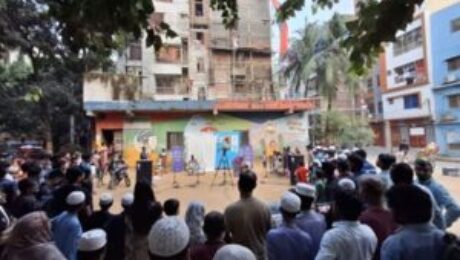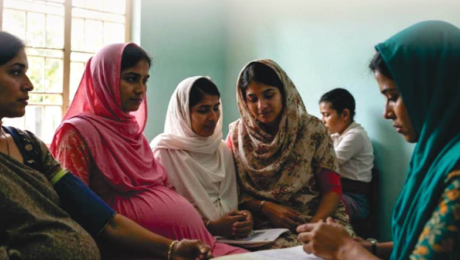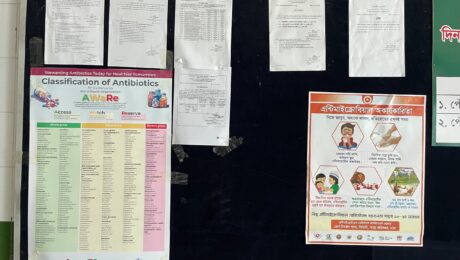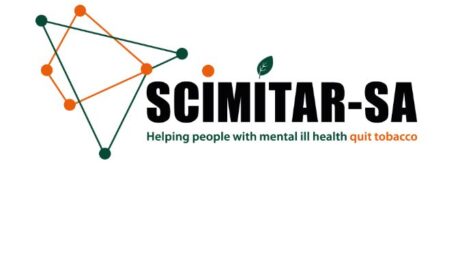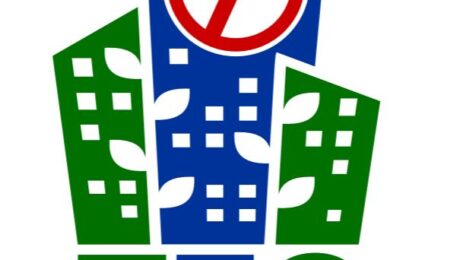Phase-1 The project is a comprehensive effort by the Ministry of Railway to create a smoke-free environment in railway stations and trains across Bangladesh. The ARK Foundation has played a pivotal role in this initiative by conducting extensive baseline and endline surveys at 10 selected railway stations, chosen in consultation with Ministry of Railway. The
- Published in Climate Change and Environment, Our Work
No Comments
Partner Organization: Horizons Institute, University of Leeds ARTS4AMR (Arts for Antimicrobial Resistance) is a pilot project for arts-based awareness-raising on antimicrobial resistance (AMR) in an underserved population in urban Bangladesh. This project aimed to highlight the value of embedding arts and culture into public health interventions to enhance participant experience and community involvement, and amplify
- Published in Antimicrobial Resistance, Our Work
Download Report Bangladesh is preparing to introduce a maternity insurance scheme by 2026, aligning with its National Social Security Strategy. This report presents an evidence-based framework tailored to the country’s healthcare and labour realities, especially for low-income and informal sector women. Drawing on national data and international best practices, it outlines a universal, mandatory, and
- Published in Featured, Maternal Newborn Child and Reproductive Health, Report, Resources
Antimicrobial resistance (AMR) is rising rapidly in Bangladesh, posing a serious threat to healthcare. To address this challenge, ARK Foundation, with support from CDC-DGHS and WHO Bangladesh, is piloting an Antimicrobial Stewardship (AMS) initiative at primary, secondary, and tertiary facilities in Cumilla and Dinajpur districts. The project started with a national-level inception meeting, followed by
- Published in Antimicrobial Resistance, Our Work
Mental disorders are a major contributor to the global disease burden, ranking among the top 10 causes of health loss. Individuals with Severe Mental Illness (SMI) (Schizophrenia, Schizoaffective disorder, Psychosis, Bipolar illness and Severe Depression with psychosis) are among the most vulnerable population groups facing health disparities, increased risk of physical multimorbidity, higher mortality, shorter life expectancy
- Published in Non-Communicable Disease, Our Work
The ARK Foundation conducts on-demand research and training in the areas of health, education, and social development. The ARK Foundation’s mission is to ensure sustainable development through research-based solutions, training and promotion in the areas of health, nutrition, population, education, gender, environment and human resource development. In collaboration with the ARK Foundation, the University of
- Published in Non-Communicable Disease, Our Work
Urban Anchal is a study looking at sustainable day-care for 1-4 year olds in disadvantaged urban communities in Dhaka, Bangladesh It aims to address the lack of safe, stimulating and health-promoting environments for adequate early childhood development (ECD). Urban slums provide a challenging environment for child health. With slum-dwelling women working long hours and
- Published in Health Systems, Our Work
The aim of this research is to strengthen civil society in Bangladesh by addressing the challenges faced by civil society organizations (CSOs) and promoting an enabling environment for their work. The project is funded by the Dutch Ministry of Foreign Affairs (MFA) under the Learning for Strengthening Civil Society (L-SCS) program. The research will be
- Published in Our Work
The Tobacco Control Capacity Programme is a £3.4 million programme of training and research funded by Research Councils UK as part of the Global Challenges Research Fund. The overall aim of the programme is to improve research capacity in low- and middle-income countries (LMICs) to conduct high-quality studies that will generate evidence on how to
- Published in Non-Communicable Disease, Our Work
The IMPACT consortium comprises four UK Universities and four partner organizations from Bangladesh, India and Pakistan. Coordinated by the University of York, IMPACT’s UK partners include the London School of Economics and Political Science, UK, University of Keele, UK, University of Dundee, UK, University of York/ Hull York Medical School, UK. Our South Asian partners
- Published in Our Work

